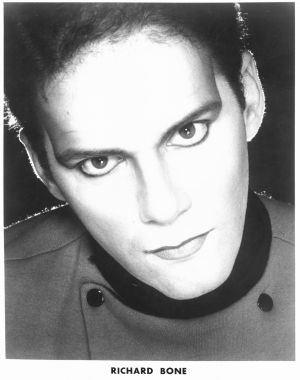New Age Voice
Magazine - by Peter Manzi
February 2000
Issue
Rockers Gone New Age
A founding member of NYC's
electronic music scene, Richard Bone's rock
roots are quite varied. Known today for his
intriguing ambient releases, most notably and
recently his '98 release The
Spectral Ships and '99s jazzy
atmospheric Coxa, his
career began writing music for the off
Broadway theatre in the '70s. It all began
when he met Lenny Kaye (from the Patti Smith
Group) who took Bone under his wing and put
him in a recording studio for the first time.
In 1980, he joined Shox Lumania as
keyboardist, a high profile NYC band within
the New York Underground elite that recorded
their first release on the ROIR
label.

(Photo from the early
80's)
"You need to understand
how intense the New Wave
movement was within New York City at the
time. Especially the sub genre called
New Romantic," stated Bone.
Shox Lumania were the darlings of the city and
it was not uncommon to find everyone from
David Bowie, Souixie Souix or Devo hanging out
in their dressing rooms. During that time,
Bone had also released an independent single
that was picked up by Survival Records in the
UK, and Bone was signed as a solo artist. A
series of solo LP's and singles followed, that
climbed the UK Indie charts after Shox Lumania
and the New Wave movement disintegrated.
"I started listening to
early electronica music when I was around 12
or 13 and I was constantly trying to bring
electronics into the traditional rock and roll
context," says Bone. "Brian Eno opened the
door for all of us seeking a musical life
beyond traditional rock. With ambient, I found
that life. There is much more dimensions to
ambient, or new age, and it has allowed me to
break out from the constrictions of rock."
Bone breaks it down technically, "I could
consider a bar of music, moving at a much
slower tempo, its own entity. Whereas with
rock it is about the whole frenetic piece. The
rock song is usually greater that the sum of
its parts, with ambient, the sum of the parts
are often equal to, or even greater than the
whole."
![]()
